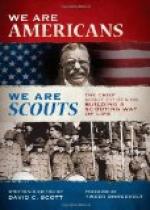We began to bury the dead, and the four men commenced to look after the teams and wagons.
In a little while they came back driving three teams, and said they had found them hooked together, feeding along quietly, and they found that nothing had been touched or carried away from the wagons.
After Uncle Kit had learned the cause of the massacre, I think he was the most out of humor that I ever saw him. He said, “Such men as the ones who fired on those Indians deserve to be shot, for they are not fit to live in any country,” and turning to Bridger he said, “Jim, it has always been such men as they that has made bad Indians and caused most all the trouble the whites have had with them, and still the Indians are blamed for it all, and have to suffer for it all. I hope I shall live to see the day when these things will be changed in this respect, and the Indians will have more justice shown them.”
But I am very sorry to say that Uncle Kit did not live to see this accomplished. It was fifty years ago that Kit Carson expressed that wish in regard to the Indians, but it has never been gratified, for in all that time the Indians have been driven from one place to another and not allowed to rest anywhere long at a time, and in my opinion certainly have not had justice done them by the white race, and I will say this from my own experience, that when an Indian professes to be a friend he is a friend indeed, in storm as well as sunshine.
I will tell an instance that occurred four years ago when I was in Indian Territory. I was sitting on the street in one of the towns when an old Kiawah Indian came along, and looked at me quite sharply and walked on a few steps, then turned and looked at me again, and then he came back to me and slapped me on the shoulder and said, “A-Po-Lilly,” which meant “Long time ago me know you.” I looked at him and said, “No, you are mistaken, I do not know you,” and then he told me where he had met me and what I had done for him, and as he recounted what had happened I remembered the incident.
The time I had first met him I was out hunting and met him in the forest. It was in the Territory of Wyoming, and he had had a fight with the Sioux, and they had shot his horse, and he was hungry and tired and footsore. I took him to my camp and fed him and kept him all night, and the next morning I gave him a horse so he could ride back to his tribe in more comfort, and I had not seen him since that morning, and this happened forty years before I saw him again, and he remembered me. He shook hands with me, which is a custom the Indians have not outgrown, and left me, but in a few minutes he returned with at least forty of his tribe with him, and I had to shake hands with every one of them. Some of them could speak good English, and they told me the story he had told them about my being kind to him, and they all called me their friend. This incident shows that the Indian appreciates kindness.




